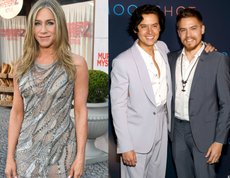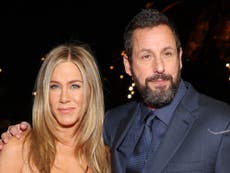The Independent's journalism is supported by our readers. When you purchase through links on our site, we may earn commission.
Jennifer Aniston is right about Friends – but that’s not all
Comedy is always changing, and every cultural creation is the product of its time

Your support helps us to tell the story
From reproductive rights to climate change to Big Tech, The Independent is on the ground when the story is developing. Whether it's investigating the financials of Elon Musk's pro-Trump PAC or producing our latest documentary, 'The A Word', which shines a light on the American women fighting for reproductive rights, we know how important it is to parse out the facts from the messaging.
At such a critical moment in US history, we need reporters on the ground. Your donation allows us to keep sending journalists to speak to both sides of the story.
The Independent is trusted by Americans across the entire political spectrum. And unlike many other quality news outlets, we choose not to lock Americans out of our reporting and analysis with paywalls. We believe quality journalism should be available to everyone, paid for by those who can afford it.
Your support makes all the difference.While promoting her new movie in Paris, Jennifer Aniston made a few comments on the state of comedy today. “Comedy has evolved, movies have evolved,” she told AFP recently. “Now it’s a little tricky because you have to be very careful, which makes it really hard for comedians, because the beauty of comedy is that we make fun of ourselves, make fun of life.”
Aniston then specifically referenced Friends, the show – you might have heard about it – that propelled her to worldwide fame when she stepped into Rachel Green’s shoes almost 30 years ago. “There’s a whole generation of people, kids, who are now going back to episodes of Friends and find them offensive,” she said. “There were things that were never intentional and others... well, we should have thought it through – but I don’t think there was a sensitivity like there is now.”
I tend to bristle when a comedian starts lamenting the state of comedy these days, and suggesting that the playing field is narrower than it used to be. But to be fair to Aniston (and I do think that if there is one thing Aniston, survivor of some of the most messed-up celebrity news cycles of our era deserves, it’s fairness), she’s not going full “Kids These Days.” There is some nuance in her comments; some things on Friends, by her own admission, could have been a little more thought through. It seems that Aniston didn’t reference any specific examples, but Friends co-creator Marta Kauffman has previously expressed regret over the portrayal of Chandler Bing’s trans parent, or the show’s lack of diversity.
It’s true that Friends has come under scrutiny over the past few years, maybe because it is a 30-year-old show that people still watch to this day. This, lest we forget, is the exception, not the rule: the vast majority of our cultural output is allowed to fade into oblivion as time goes on. But when a creation like Friends endures beyond this natural life cycle, then, yes, people will have thoughts. They might notice discrepancies between the world portrayed in the show and their own. Some elements might make them uncomfortable, or they might put the evolution of social mores in stark relief.
So, Aniston isn’t wrong: comedy is always changing. The things we find funny evolve with us, with our preoccupations, and with our expectations. But I don’t think this signals the end of comedy. I don’t know how else to put it: people are so funny, in so many ways. I have spent so many hours of my life benefitting from other people’s humor when I should have been doing something else.
Television gives me a choice between Succession’s sarcasm, Bob’s Burgers goofiness, and the biting observations in Pretend It’s a City, Martin Scorsese’s series featuring conversations with Annie Leibovitz for Netflix. Speaking of Netflix, we live in the golden age of the comedy special. Whose do I want to watch today? Wanda Sykes’s? Iliza Shlesinger’s? Pete Davidson’s? David Spade’s? They’re all there! Even this guy I went to school with, Kev Adams, got one last year called The Real Me. His comedy is in French, but suddenly, here he is, with his bons mots subtitled in English, accessible to Netflix subscribers around the world.
Even the internet provides us with top-notch comedy – seriously. I open Instagram and laugh and laugh. My Twitter feed is often hilarious, thanks to a well-trained algorithm that will presumably be blown to smithereens when Elon Musk’s plans to turn the platform into a digest of whatever people who are willing to pay him $8 a month have to say go into effect. Hours of trawling on my phone led me to the ultimate conclusion that people are truly witty. They are irreverent, smart, and droll – and, thanks to social media, are working within an ever-expanding framework of common references that creates opportunities for even more jokes.
There is a refrain that often shows up in discussions of comedy vs the passage of time: “You couldn’t make [insert TV show or film] today.” It’s often meant as a lament, a way to imply that we live in such buttoned-up times that they would deprive us of the things we have come to love and enjoy. But every cultural creation is the product of its time. “You couldn’t make [insert TV show or film] today” is an assertion that is both evergreenly true and far less dramatic than it sounds.
Take, for example, a little-known show I have been watching for the very first time over the past few weeks, with gusto. I’ll be the first to say it: You could not make The Sopranos today. You could make a show about some mobsters in New Jersey, but it would not have the same flavors, language, and characters as The Sopranos.
For one thing, words are employed in The Sopranos that we have since decided should not be used in polite society. But also, The Sopranos was a show about a certain kind of modernity – one that we now commonly refer to as “the past.” Its anxieties were about the turn of the millennium, and the American dream, and the lengths people will go to in order to live what used to be considered a fairly middle-class lifestyle. (As someone who entered the job market after 2008, I laugh and laugh at the concept that opulent, mass-market-produced houses like the one Christopher Moltisanti buys in season six could be considered middle-class, but I digress.)
These discrepancies have not kept The Sopranos from earning a new generation of fans. Michael Imperioli and Steve Schirripa, two of the show’s stars, created an entire podcast about it (Talking Sopranos) in 2020, and in 2021, published a whole book about the series (Woke Up This Morning: The Definitive Oral History of The Sopranos).
Which brings me back to Aniston’s comment that “there’s a whole generation of people, kids, who are now going back to episodes of Friends and find them offensive.” As a side note, I wonder if the people doing that are actually “kids” or if they are, like me, aging Millennials taking another look at the things they enjoyed in their younger years. In any case, yes – I’m sure if I sat down with a child I would have to explain a few things. But I like to think those thoughtful conversations would enrich the experience. Nor would they detract from the essence of Friends, a show that was at its funniest when it wasn’t punching down.
When I think about my favorite Friends moments, I think about Ross, hiding in his date’s bathroom with his leather pants stuck down his legs, an unfortunate mixture of powder and lotion covering his body. I think of Chandler and Rachel trying to get a couch up the stairs while Ross unhelpfully instructs them to “pivot.” I think of Ross dreadfully playing the bagpipes ahead of Monica and Chandler’s wedding – and Phoebe “singing along.” I think of Rachel and Phoebe pretending they’re jumping up and down at the prospect of Ross’s move to conceal the fact they’ve just caught Monica and Chandler making out – and Ross joining in.
Not every Friends moment is meant to endure, but that’s par for the course. The timeless bits remain.




Join our commenting forum
Join thought-provoking conversations, follow other Independent readers and see their replies
Comments